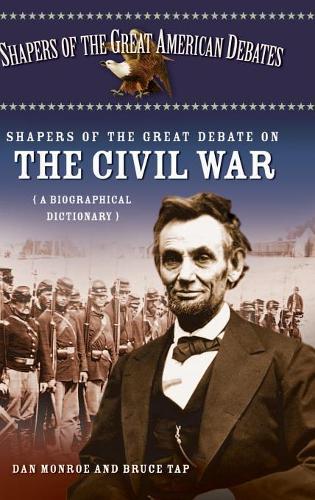
Shapers of the Great Debate on the Civil War: A Biographical Dictionary
(Hardback)
Publishing Details
Shapers of the Great Debate on the Civil War: A Biographical Dictionary
By (Author) Dan Monroe
By (author) Bruce Tap
Bloomsbury Publishing PLC
Greenwood Press
30th July 2005
United States
Classifications
General
Non Fiction
Civil wars
Early modern warfare (including gunpowder warfare)
973.70922
Physical Properties
Hardback
436
Width 156mm, Height 235mm
794g
Description
With the conclusion of the Mexican War in 1848, the United States seemed poised to fulfill the manifest destiny that was on the lips of journalists and politicians. Yet, even before the war was over, tensions over the issue of slavery erupted. Slavery symbolized the social, cultural, constitutional, and economic differences that were dividing the North and South. Through four years of bloody civil war and the loss of over 600,000 lives, the American republic decided the fate of slavery, asserted the supremacy of the federal government over state authority, and began to grapple with the difficult issues of reconstruction. This work provides substantial biographical entries of 20 individuals who shaped and defined the debates during the Civil War period. Political and military figures, such as Abraham Lincoln and Robert E. Lee, writers such as Harriet Beecher Stowe, and abolitionist reformers, such as Frederick Douglass and George Fitzhugh, are included. With the conclusion of the Mexican War in 1848, the United States seemed poised to fulfill the manifest destiny that was on the lips of journalists and politicians. Yet, even before the war was over, tensions over the issue of slavery erupted. Slavery symbolized the social, cultural, constitutional, and economic differences that were dividing the North and South. Through four years of bloody civil war and the loss of over 600,000 lives, the American republic decided the fate of slavery, asserted the supremacy of the federal government over state authority, and began to grapple with the difficult issues of reconstruction. This work provides substantial biographical entries of 20 individuals who shaped and defined the debates during the Civil War period. Political and military figures, such as Abraham Lincoln and Robert E. Lee, writers such as Harriet Beecher Stowe, and abolitionist reformers, such as Frederick Douglass and George Fitzhugh, are included. Each biography provides a concise account of the subject's life, followed by an analysis of the figure's role and contribution to the central issues of the day, and concludes with a bibliography of secondary and primary sources available to students. An appendix of over 180 additional biographies highlights the lives of others who played a role in the debates of the Civil War.
Reviews
Shapers of the Great Debate on the Civil War: A Biographical Dictionary is a collection of nineteen brief biographies (usually ten to twenty-five pages) detailing the lives of key figures in the Civil War era who participated in the public discussion on almost all of the controversial issues of the day.The book could be used in a survey course or as a desk reference. * Journal of Southern History *
Author Bio
Dan Monroe is the author of The Republican Vision of John Tyler and At Home with Illinois Governors: A Social History of the Illinois Executive Mansion. Bruce Tap is an independent historian who is the author of Over Lincoln's Shoulder: The Committee on the Conduct of the War, which was selected as a Choice Outstanding Academic Book. He has also published in Civil War History, Journal of the Abraham Lincoln Association, Illinois Historical Journal, and American Nineteenth Century History.
